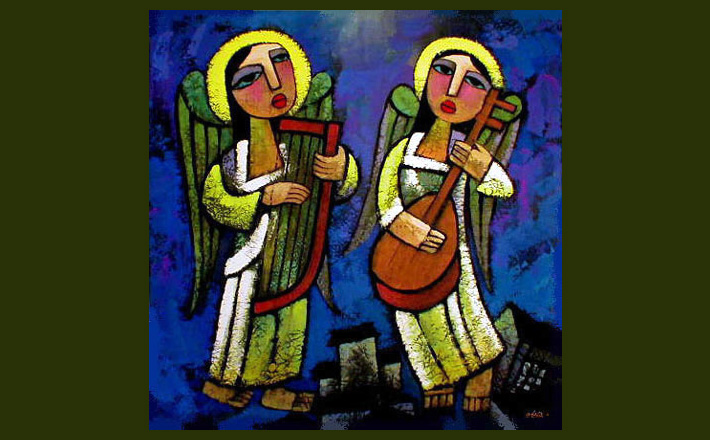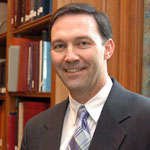Commentary on Psalm 96:1-9
Psalm 96:1-9 calls all people of the earth and indeed the earth itself to sing praise to God and to worship God in God’s temple.
This section of the psalm is dominated by imperatives that call forth that praise: “sing to the Lord;” “tell of his salvation;” “declare his glory;” “ascribe glory and strength;” and “worship the Lord.” The opening call to sing a “new song” does not elicit a song with fresh lyrics or music, but a song with universal scope that declares the extent of God’s sovereignty. Such a song is new is that it “breaks out of the category of space and time and embraces all things.”[1] Although the song appears on the lips of God’s people who worship in the temple, it recognizes God’s guidance of and reign over all creatures.
The reason for the praise the psalm evokes is the identification of God as the one true lord of heaven and earth, the maker of all things (verses 4-6). The song originated in a time and place in which many deities were recognized. Every nation had its gods and claimed them to have sovereignty. The Babylonians, for example, declared that their chief deity, Marduk, created the earth and ruled over it.
Psalm 96:5 declares, however, that Marduk and the other gods are merely idols. That is, the images that represented them were the extent of their reality. Only God was real and powerful and therefore worthy of praise. With this claim Psalm 96 stands close to Second Isaiah who proclaims that Israel’s God is the true creator and only this God has sovereignty over the earth (Isaiah 40:18-20).
Psalm 96:7-9 are almost identical to Psalm 29:1-2. It is possible that Psalm 96 borrowed this section from Psalm 29. If that is the case, however, Psalm 96 has altered the language to fit its context. While Psalm 29 is set in the heavenly realm, with its call for the heavenly beings to ascribe glory to God, Psalm 96 addresses those gathered in the earthly temple. Indeed, Psalm 96:7-9 invites all humankind to “ascribe” strength and glory to the Lord and to offer in his courts worship that is appropriate for the sovereign God.
Psalm 96:1-9, with its testimony of God’s rule over the earth (see also verse 10, “The Lord reigns!”), is part of a grouping of psalms that focus on the reign of God (see Psalms 93, 95-99). These psalms are sometimes categorized as “enthronement psalms” because of they speak of God’s eternal kingship. This psalm and the larger group of enthronement psalms appear in a section of the book of Psalms (Book IV, Psalms 90-106) that seems to be organized to deal with the theological crisis of the Babylonian exile in 587 BCE.
The theological crisis is expressed in many of the psalms that precede this section (Book III, Psalms 73-89). Such psalms painfully related doubts about Israel’s core beliefs (the central role of Jerusalem and the Davidic king in God’s plan, for example). But Psalm 96 along with the other enthronement psalms reminded those who doubted that God was still in control, that God is the one who “made the heavens” (96:5) and therefore God is able to secure the future for God’s people.
What is striking about the claims of Psalm 96 is how untrue many of the statements in the psalm might have seemed to those who spoke them. The people of Judah were constantly at the mercy of enemy nations all around them. Their history started, of course, with slavery in Egypt. After being delivered from bondage and entering the land God promised them they struggled with the Philistines, the Edomites, Ammonites, and the Moabites. Eventually they would be destroyed and exiled by the likes of Assyria and Babylon.
Even in the glory days of David and Solomon these people lived in a small and rather insignificant kingdom in comparison with the great empires of their day. In light of that fact, it may seem rather silly to claim that Israel’s God is “feared above all gods” (verse 4). On what event or events did Israel base its claim to a unique place in the world order? How could Israel claim that its God was king over all the earth?
The answer to these questions lays in the fact that Israel, and later the church, understood their claims of God’s kingship as a future reality. They understood God’s reign eschatologically, as something to come, to be fulfilled when God brings creation to its fruition. The liturgical celebration of God’s reign, therefore, celebrates something that is not fully evident right now. But that does not mean this psalm, or any other liturgy, presents a false hope or a naive view of the world.
Rather, it gives a way to state and restate what God’s people believe about the world. Most importantly, what the psalm says about the world to come shapes the way God’s people live right now. This is the power of liturgy, and the power of Psalm 96. The proclamation only makes sense, however, when it is made in the company of other believers. Together we declare what we believe about the world. As we do, we create a community that not only believes in God’s reign with the head, but also responds to God’s kingdom with the heart. To live as though we belong to the kingdom of God means that we work to bring justice and well-being, just as God also is working.
Psalm 96:1-9 appears in the lectionary on the second Sunday after Pentecost. That liturgical location gives yet another crucially important focus to the interpretation. Pentecost for the first Christians was marked by an outpouring of God’s Spirit that empowered them to proclaim the Good News so that all people might hear, understand, and respond (Acts 2:5-42). As a psalm for the time after Pentecost, Psalm 96:1-9 likewise invites all the creatures of the earth to declare the glory of God. For the church, God’s glory is known most clearly in Jesus Christ.
[1] Hans-Joachim Kraus, Psalms 60-150: A Continental Commentary, trans. Hilton C. Oswald (Minneapolis: Fortress, 1993), 252.


June 2, 2013